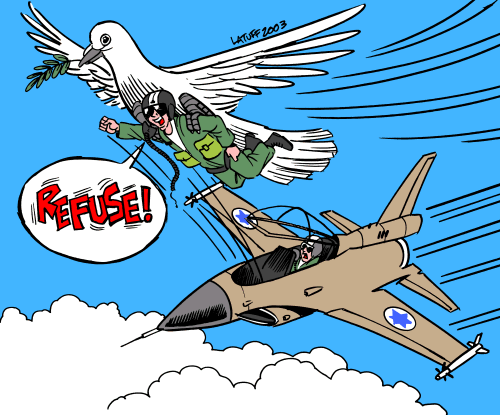Happy 5764 (by Latuff)
Latuff | 25.09.2003 17:20 | Anti-militarism

Refuse
By KARIN LAUB, Associated Press Writer
JERUSALEM - A group of reserve air force pilots elicited wall-to-wall condemnation Thursday for their refusal to carry out air strikes in Palestinian areas, but their unprecedented protest set off an emotional debate on the ethics of the targeted killings of militants.
Pilots are held in the highest regard in Israel and their views carry considerable weight, since their skill and audacity are seen as key to Israel's survival.
Wednesday's signed declaration condemning the air strikes shook the nation and also raised new questions about the limits of protest in the military. The air force commander, Maj. Gen. Dan Halutz, said the signatories would be punished — possibly jailed — and accused them of playing politics, rather than grappling with genuine moral dilemmas.
The group of 27 is informally led by Brig. Gen. Yiftah Spector, a highly decorated retired pilot who, according to Israeli media reports, participated in the bombing of the Iraqi nuclear reactor in 1982.
Nine of the pilots are still on active duty.
In their petition, the pilots said air strikes on crowded Palestinian areas are "illegal and immoral." They also condemn Israel's continued occupation of the West Bank and Gaza, saying it corrupts Israeli society.
In the past three years of fighting, Israeli pilots have carried out hundreds of air strikes in the West Bank and Gaza Strip, targeting Palestinian police installations and weapons workshops of militants.
The most controversial of the air strikes involve targeted killings, in which helicopters — and sometimes warplanes — fire rockets and bombs at cars and homes of Palestinian militants.
In the past three years, some 140 wanted men have been killed in targeted raids, not all of them air strikes, according to Palestinian medical officials, though the figure also includes those killed resisting arrest. More than 100 bystanders have also died, according to the medical officials.
The Israeli public, traumatized by a Palestinian suicide bombing campaign that has killed hundreds of civilians since September 2000, largely supports the army's tough measures, including the targeted killings, widely referred to in Hebrew as "liquidations."
The rebel pilots were lambasted Thursday in commentary in newspapers and radio talk shows. Critics accused the pilots of being immature, naive or having a secret political agenda.
Prime Minister Ariel Sharon was quoted as saying the protest was a "grave matter" and would be dealt with swiftly. Former Israeli President Ezer Weizman, who commanded the Israeli air force in the 1960s, said the pilots' stance was immoral, and belittled their apparent idealism as a "holier than thou attitude."
Veteran journalist Dan Margalit wrote in a front-page commentary in the Maariv daily that the pilots abused their exalted standing.
"If their (the pilots') idea is accepted, Ahmed Yassin and his compatriots in the Hamas leadership will be able to plan the next murder of Jewish children on a Jerusalem bus without interference," Margalit wrote in a reference to a mid-August bus bombing by Hamas that killed 23 bus passengers, six of them children.
In response to that bombing, Israel accelerated its targeted attacks, killing 13 Hamas members and six bystanders in nearly a dozen air strikes in Gaza City. Yassin, the Hamas founder and spiritual leader, himself survived an attack earlier this month.
The letter of protest marked the first time pilots have come out openly against air force policy. In the 1982 invasion of Lebanon, some pilots expressed reservations about bombing cities and refugee camps, but did not go public.
Halutz, the air force commander, played down the importance of the protest, saying the pilots were only a handful among thousands.
However, some warned the protest could spread because of growing unease in the armed forces over military strikes that have failed to stop terror attacks.
"Today, in light of pointless military operations ... people are beginning to ask questions," wrote military commentator Alex Fishman in the Yediot Ahronot daily. "And these (the pilots) are the very best people we have. We can ground them, and we can lock them up, but we cannot ignore the questions they ask."
Yediot said dozens of Apache helicopter pilots, who carry out the bulk of the air strikes, have met with their wing commander to express their concerns. One participant said he was not convinced of the justice of his missions, Yediot said, and others complained that they were given bad intelligence that could endanger civilians.
The rebel pilots could not be reached for comment Thursday, but Lt. Col. Zeev Rotem, a retired combat navigator speaking on their behalf, said the norms of the air force have changed in recent years.
"Today, we attack places where there are civilians, women and children, with the prior knowledge that ... there is a great chance they will be killed," Rotem told Israel Radio. The protest, he said, is a desperate attempt "to make the army, the government and the citizens ... stop this crazy cycle that has hijacked this country."
A watershed, for some pilots, apparently was last year's attack on Salah Shehadeh, leader of the Hamas military wing. A one-ton bomb killed Shehadeh, an assistant and also 14 civilians, nine of them children.
Halutz said at the time that he felt the bombing was morally correct.
Latuff
 e-mail:
latuff@uninet.com.br
e-mail:
latuff@uninet.com.br
 Homepage:
http://seruv.org.il/defaulteng.asp
Homepage:
http://seruv.org.il/defaulteng.asp